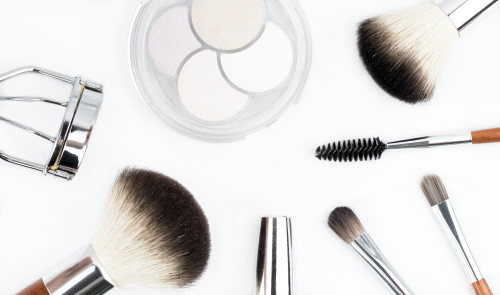Raise your hand if it’s been a little over a year since you’ve really worn makeup. With the pandemic, many of us didn’t have to worry about dabbing on makeup before starting our day. We only had to open up our trusty Zoom and Instagram filters and off to virtual work and social events we went.
As things slowly start to improve, and we gain more control over COVID-19, you may be venturing out more and want to reach for the beauty products collecting dust in your bathroom—but take pause, my friend.
BREAKING: 72-Year Old Grandma's Anti-Aging Discovery Sweeps The Nation
While we appreciate the many benefits makeup adds to our physical appearance and self-confidence, there may be some makeup myths you’ve been listening to and probably following. And if you’ll be dabbing your favorite products on once again, this is the perfect time to highlight some common misconceptions and helpful reminders before you beautify.
Myth #1: Makeup doesn’t expire
It’s not just food that expires, your makeup does too! According to Janet Conner, an infection preventionist, “unopened, completely sealed makeup stored in a cool, dry place should last you a couple of years,” but once the item is open an invisible clock starts ticking. That’s because, the more you expose the makeup to air, your fingers, brushes and face, you’ll transfer a variety of germs back onto the products, where they’ll grow and fester. And, if you use plant-derived products, they usually have an even shorter shelf life.
“Over time, makeup will start to break down and can serve as a reservoir for bacteria, viruses and fungi that may cause acne, rashes or other infections, including eye infections,” Conner said. “Generally, your liquid products like eyeliner and mascara are good for a few months and lipsticks up to two years.”
Makeup Tip: The law doesn’t require cosmetics to have an expiration date, although some have it marked on the packaging or on the product itself. Marking the container with the date you open it may help you keep track.
Myth #2: No need to wash makeup brushes after every use
I mean, we wash our clothes after one use, shouldn’t we wash our brushes too? “Yes, you should,” Conner said. “If using makeup brushes or applicators, clean or discard after use. And, if you use makeup sponges, you’ll want to dispose after one use as sponges can be a breeding ground for bacteria and a variety of molds.”
Makeup Tip: Every time your brushes come in contact with product, you should wash them with either a special makeup cleanser, baby shampoo or antibacterial dish soap with a little bit of olive oil. Then allow the brushes to air dry completely. If you’re using your hands to apply makeup, make sure you wash them thoroughly beforehand and in between applications. “Hand hygiene is the single most effective method of preventing the spread of infection,” Conner said.
Myth #3: Natural and organic makeup is better and less toxic
Everywhere you look these days, you’ll see makeup products advertising they are “natural,” “all-natural” or “organic.” But here’s the thing, “none of these keywords have any relation to toxicity” or whether they are, in fact, better or safer for you, said Bryan Kuhn, PharmD, a pharmacist and poison education specialist. It all comes down to the dosage.
“Water is organic, pure and natural but it can certainly be toxic—even fatal,” Dr. Kuhn said. “Everything on this planet is potentially toxic and nothing is without toxicity. It’s the dose and the amount you’re exposed to that creates a toxic exposure.”
Unlike foods, cosmetics must be processed in some way. It’s not like you have a lipstick plant growing in your backyard. Most cosmetics are non- or minimally toxic, although there are some notable exceptions like adhesives for fingernails or eyelashes, nail polish removers, hair and skin bleaching, lightening/relaxing products, depilatories and some body oils and perfumes.
Makeup Tip: If you’re ever worried whether a makeup product is natural or organic, start with products certified by the Natural Products Association. Whole Foods also has a fairly strict code on the products it sells. For any ingredients you’re unsure of, you can research online or call your regional poison control center at 800-222-1222. They have extensive databases they use to understand the relative toxicity of most products in the U.S. and abroad.
Myth #4: Makeup products with fewer ingredients are better
Many people who look for natural or organic makeup products are also hoping for a shorter ingredient list. And while it’s true that some products are full of things you need Mary Poppins to help spell/sing out for you, a lot of organic and natural ingredients still require some additives—and yes, a wee bit of parabens to prevent any harmful bacteria or mold.
Makeup Tip: A good rule of thumb is to purchase products that are “fragrance-free, oil-free and mineral-based and to recognize what oils and dyes you may be sensitive to in order to avoid allergic reaction,” Conner said. Many things that are natural, can also cause allergic reactions.
When it comes to parabens, look for products that have it listed toward the end of the ingredient list. This means it has a minimal amount compared to other ingredients in the makeup. If you noticed it’s listed at the top or several times, avoid it. For additional questions about ingredients, visit the U.S. Food and Drug Administration’s website.
Other helpful makeup reminders
It may be a bummer to toss some of those products in the trash, but it’s also fun to go out and freshen up and play with your look with new beauty products. Before we close out this post, here are some additional things to remember before you reapply your makeup.
- Ensure that any product not intended for consumption is stored up and away from children. “Given the fact that many of these products are normally stored in a purse or diaper bag, it’s easy to see why we receive so many calls from concerned parents,” Dr. Kuhn said.
- Toss out any makeup after having an eye infection, cold, flu, COVID-19 or any lesions in and around your mouth.
- Don’t share your makeup. “Microorganisms can be transmitted person to person via makeup products unless stringent hygiene is practiced,” Conner said. “It’s best to keep these products personal and not share than risk a skin infection.”
- If you notice you’re having an allergic reaction to a product, stop using it immediately and contact your doctor.
TRENDING: Doctors Can't Believe She Used This To Erase Her Wrinkles...
For additional skincare questions or concerns, talk to your primary care provider or schedule an appointment with a dermatology specialist.









